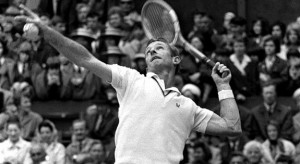Killer instinct. It’s an attribute that all champion tennis players have – whether born with it or whether it is learned behavior. While mild-mannered, polite and humble, Rod Laver, arguably the greatest tennis player of all-time, had it and used it to become the only player two win the Grand Slam of tennis twice. In his newly updated and re-released memoir THE EDUCATION OF A TENNIS PLAYER ($19.95, New Chapter Press, www.NewChapterMedia.com) Laver discusses killer instinct in this book excerpt below.
By Rod Laver
When I was a kid, and beginning to play well, a little better than the ordinary, I first experienced the enjoyment of playing to a crowd. It was a good feeling to have my strokes admired, and I was in no hurry to get off the court. As a result I let too many opponents off the hook. I found out that you have to play with the intention of making it a short day, of doing the job quickly and thoroughly.

I don’t mean rush it. Anything but that. But when you have the opportunity you strike then, and you realize that no lead is as big as it looks. If your opponent is serving at 1-4, you feel pretty good: three games ahead. But that’s only one service break, and you want to keep the pressure on, or you’re going to be in trouble. It’s no time to experiment with new shots or to show off for the “sheilas” in the crowd.
I’ve heard it said that you’re either born with the killer instinct or you’re not. I don’t agree with that. I feel I had to develop that killer outlook which, to me, means making the shot called for to win the point and resisting certain temptations. You don’t try to blast a ball 200 mph crosscourt into a corner when you have an easy sitter and your opponent is way out of position. If a soft, unimpressive-looking dink is called for, you hit it and make the point.
The good chances don’t come that frequently, and the killer knocks them off surely when presented with them. The killer doesn’t let up or ease off when he gets a good lead. This can be learned. Make sure of the easy shots—concentrate extra hard on those. Everybody has problems with difficult shots, but the killer gets his edge because he is meticulous with the setups.
Don’t compose eulogies to yourself when you get ahead. Concentrate on staying there. When Charlie Hollis, my coach, decided that I wasn’t homicidal enough, he sent me out with the intent of winning every match 6-0, 6-0. That seems grim for the usual player, but Charlie’s theme was good and clear: run scared and don’t let anybody up.





